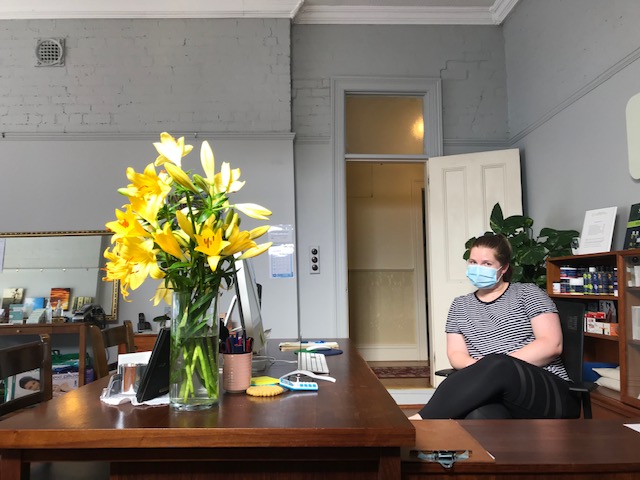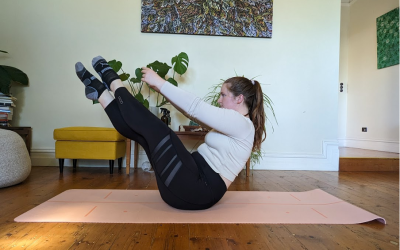Two days before Christmas I found out I had covid. The next few hours were mostly anxious phone calls to all my close contacts; luckily nobody had gotten a covid from me and I did not spoil 20 odd Christmas gatherings. But once everything calmed down, the symptoms started and I realised I was massively ill-equipped. When you’ve got covid you need to stay home, and then what? How do you cope with covid at home?
Body aches
Is it covid or is it my usual aching? Back pain after sitting in bed all day was standard, but when my skin felt tender I knew this was different. Luckily body aches are my specialty.
- Find your comfy position at rest (for me, lying on my right side with a pillow between my knees took the pressure off my pelvis enough for me to get to sleep)
- Anti-inflammatories – Medications (panadol is great, use what works for you, Julie frantically threw me a packet of Nurofen from her car window and that worked excellently), creams (rub it where you feel sore; Fisiocrem, Voltaren gel, tiger balm, etc.)
- Gentle movement – Low energy movements like rocking the legs side to side, ankle and wrist circles to keep your blood circulating, use the outdoor space you have, get some fresh air, and stretch your legs.
Sore throat
Maybe it’s just me, but the covid sore throat was different from anything I’ve had before. Looking at my throat I had no swelling or redness, it just felt like I was swallowing knives. I had tried icy poles but found that made it feel worse so went straight for the tea instead.
- Herbal tea – Avoid milky teas, they’ll give you more mucus at the back of your throat making you cough and swallow more than you want to. Lemon, ginger, honey tea (legendary combo, buy it in bags or make it fresh).
- Soup – If you’re wondering how to prepare for covid, make up some soup/stock and freeze it ready to go. I’m a rubbish cook so I got laksa delivered after a day of not wanting to eat anything because swallowing hurt so much, it was perfect, it gave me enough pain relief to be able to fall asleep.
- Throat lozenges – These worked for maybe the first 12 hours of sore-throat-day, but then became a bit redundant, maybe you’ll have better luck than me
- Self-massage – Trying to swallow without hurting your throat will tense up the neck muscles, use gentle pressure like putting on sunscreen, and run your hand along the front, sides, and back of your neck.
The Cough™
This was my least favourite symptom and the one to stick around the longest. I had a dry cough that stopped me if I tried to laugh. For those that get The Cough, your breathing won’t be excellent for a while, do your best to rest now so your lungs can recover. If your breathing is consistently difficult you need to get in contact with your GP, you’re losing oxygen in the bloodstream so don’t wait, you might not have the energy later.
- Drink plenty of fluids – warm drinks especially, it will act as a heat pack for your respiratory organs and prevent you from becoming dehydrated.
- How you sit/lie – I found lying on my side and stomach kept the cough at bay (if your bank does not appreciate lying face down, try a pillow under your hips). Avoid being reclined or on your back, it’s a lot more effort for your lungs.
- Air humidifiers – If not available to you, a hot shower with all the steam will do a fairly similar job, take as many showers as you like and call it productivity.
- Cough syrup – I’ve never used it in my life prior to this but I personally liked it and it suppressed my coughing fits for a few hours.
- Pulse oximeter – great for easily monitoring your blood oxygen levels. Read the RACGP guide linked below for more info.
Nausea or dizziness
This symptom was strange, I’d been reading that it was a pretty common symptom the day before and thinking “well, I won’t get that”. It was a good reminder to stay humble and to not put any pressure on being anything close to productive.
- Lie down and rest – I cannot stress enough the need to just rest.
- Ginger tea and lemonade – This is just how I’ve always handled nausea, it might even be a placebo at this point but I don’t care it works for me.
- Hydralyte – Go for the drink at room temperature instead of the icy pole if you can.
Note: dizziness can also result from a lack of blood oxygen, if your breathing is struggling and you feel dizzy, your symptoms might be worsening, get in contact with your GP or get to the hospital.
Some extra stuff
- The more time you spend resting, the better your body is going to cope. Push yourself too early and you’re looking at your symptoms potentially lasting longer than you would like. You just got covid so milk it for what it’s worth.
- Get a thermometer – You can track your temperature, and if it’s over 38℃ that would indicate a fever, your symptoms could progress from mild to moderate.
- While it seemed like a good idea on Christmas day, drinking alcohol made my ability to function so much harder, avoid it until your symptoms are over.
- Taking care of my mental health was challenging since I had no energy to do anything. Get fresh air, shower, watch comfort tv, and meditate. The semi-regular visits from family and friends dropping off food and supplies was extremely important.
- There will be a long list of stuff you need to do but don’t have the energy for. To end my quarantine, I changed my sheets and threw out the old toothbrush. Just do what you need to clear the mental space that being unwell takes up.
This is anecdotal advice on ways to manage mild Covid symptoms at home. It should be noted that this advice may not apply to people who are immunocompromised, unvaccinated, or experiencing severe symptoms. The RACGP guide (linked below) has useful information about differentiating between mild and severe symptoms, how to monitor your symptoms, and mental health advice. Please refer to the links at the end for more info and stay well.
Resources
- RACGP guide to managing Covid at home: https://www.racgp.org.au/FSDEDEV/media/documents/Clinical%20Resources/Guidelines/Managing-mild-COVID-19-at-home-with-assistance-from-your-GP.pdf
- Managing Covid at home: https://www.coronavirus.vic.gov.au/managing-covid-19-home
- Monitoring Covid-19 Symptoms: https://www.healthdirect.gov.au/managing-covid-19/monitoring-covid-19-symptoms




